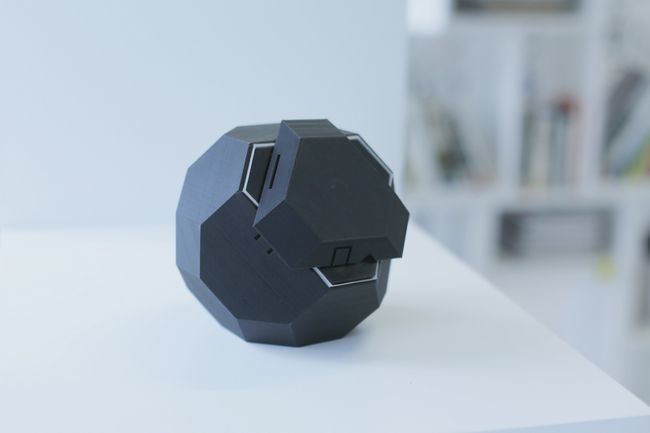User:Jeanine Verloop/minor q14 research
>>> research <<<
weapons of data destruction
QUARTER 14
paper
references
PICTURES
Collaborators
THARIM CORNELISSE
Major // illustration
PAGE THARIM
JEANINE VERLOOP
Major // illustration
PAGE JEANINE
Contents
Forward/Introduction
Tharim is the digital, Jeanine is the craft.
Where Jeanine is running in material stations, Tharim likes to stare at his screen for hours. We teamed up because we complement each others flaws and because of our shared view on art, aesthetics and technology. We don't consider ourselves classic illustrators and feel a strong urge to work with interesting techniques and materials.
Abstract
Social media is getting more and more accurate in showing you what it thinks you want and believe. It creeps us out because the algorithm used is under the surface, we see no physical explanation. Because of this people are feeling watched and not safe. And so we gather around the campfire, telling stories of the modern boogieman lurking in the shadows of our devices, spying and gathering information.
Within this conflict we fought a small battle. Our weapons of choice: tactile and understandable devices, which create dirty data.
Central Question
How does the individual cope with data farming [1]?
Relevance of the Topic
Data farming is a very present-day subject. We are on a critical point of learning how to deal with it. People are afraid of it just like every other time in the past when technology makes a jump [2].
Data is the new opportunity and businesses are in a race to be on top of it. “We’re running out of time. What we decide today will create the future.” [3].
This affect both, the individual and society. Data is a new currency with a lot of people unknowingly providing it.
Hypothesis
Our collection will not have a real effect, in the sense that it does not help to blur the data on a scale that makes it unusable. Our weapons will send a positive message, positive in the sense that we are in control and not the technique. That there is a face behind the technology that we can disrupt through minimal adjustments.
We hope that our weapons radiate reliability through operation, design and material choices. We want to achieve this by working with solid, recognizable and natural materials.
Last but not least, we hope our work is going to make people think, reflect and laugh.
Research Approach
The subject is very actual. There are hundreds of news articles to read about it, and thousand times more individual opinions to find on the internet. All of these sources were valuable to us to form our own opinion and to make a sketch of the human reaction to the echo chamber.
Key References
Instagram is listening to you, Damián Le Nouaille [4]
Please Instagram, explain to me how you’re doing this. I’m a developer, I know how iOS and networks work, and I’m still very curious about the technology you’re using.
Thero Privacy control, Roman Torre and Angeles Angulo
'Privacy and security on the Internet is a hotly debated topic. On the one hand, there’s a possible need to be able to track and find people that would like to to others harm. On the other, there’s the idea that it’s no one else’s business what you search for, or what websites you visit. Still another faction would simply like to sell and use this data for profit in exchange for the use of their services. All of these issues come together to make security choices complicated for computer-savvy individuals, and likely nearly impossible for those that aren’t.'
'To address this issue, Roman Torre and Angeles Angulo have come up with a Raspberry Pi 3-based physical device called THERO that lets you manage security settings with the turn of a dial.' [5]

Literature
“I produce my voice, but my voice also produces me.”
RESONANT BODIES VOICES MEMORIES - Johanna Biľak
“And what is voice if it is not simply an instrument for self-expression and self-realisation we can
command?”
Steven Connor, Dumbstruck: A Cultural History of Ventriloquism. pp. 3 - 5 and pp. 342 - 346
Jean-Peul Satre - Being and Nothingness [6]
Experiments
(what are you going to test out and why) Different ways of lying to ourselves:
Waarom is dit nog relevant? Ons zelf voorliegen om een andere input te geven aan het web?
Lyrebird.ai Etiketten Autocorrect
Material experimentation with concrete, aduino and wood (lasercutter)
Insights from Experimentation
(what have you pulled from your hands on practice based research?)
Artistic/Design Principles
The objects that we want to make have to be raw. They have to be the opposite of the smart and futuristic algorithms and computers. The tools should have one function and this function should be clear when you see the tool. We want to work with sturdy and natural materials that amplify the primitive touch of the tools.
The objects that we want to make will present devious solutions. By doing so we hope to bring a positive side to a heavy problem. We want to put a grin on people their face while they use our tools.
Our weapons will have specific targets. We want to bring the battle to a personal level. The faceless machine that we encounter on the internet is so much easier too fight when we attach a face to it.
Artistic/Design Proposal
(what do you propose to make)
Realised work
(what did you actually make)
Final Conclusions
(what was the point? what do you take away?)
Bibliography
- ↑ reference, data farming, wiki reference page
- ↑ Peter-Paul Verbeek, Wij hebben geen klauwen en dus hebben we ’n iPhone, website
- ↑ JoAnn Stonier, Data is the new currency, article
- ↑ Damián Le Nouaille, Instagram is listening to you blogpost
- ↑ Jeremy S. Cook, THERO : A Physical Device for Internet Privacy Control website
- ↑ Jean-Paul Satre, Being and Nothingness book